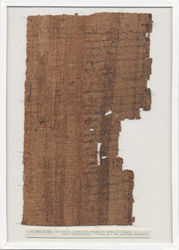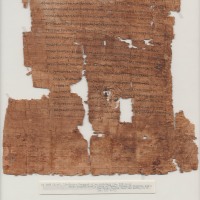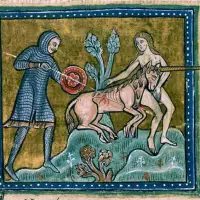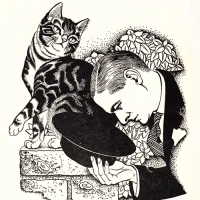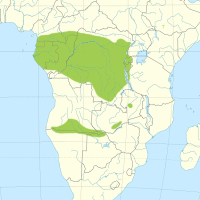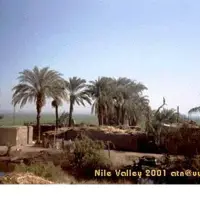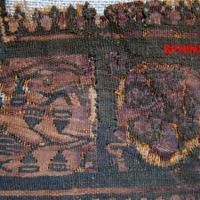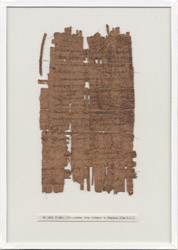
An example of a retrieved manuscript; Menches, kômogrammateus. (village scribe) of Kerkeosiris. Source – Bancroft Library, UC Berkeley
Ptolemaic rulers in Egypt sought both to assure taxes for their own coffers, as well as to administer what were considered benevolent rulings. We are fortunate to have an extremely large collection of manuscripts, many of which were administrative and were unearthed from ruins located in the Fayum, or retrieved from the cartonnage of both human and crocodile mummies in several sites in the Fayum and elsewhere in ancient Egypt.
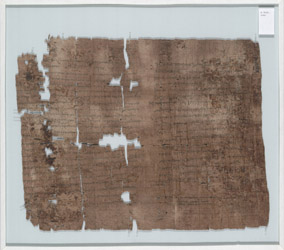
An example of a retrieved manuscript; Menches, kômogrammateus. (village scribe) of Kerkeosiris. Source – Bancroft Library, UC Berkeley
Here are translations of two interesting examples of such manuscripts, the first being a proclamation of amnesty conferred by the Ptolemaic rulers – King Ptolemaios and Queen Kleopatra the sister and Queen Kleopatra the wife – on subjects who were in specific occupational categories, and the second by a village scribe with its subjoined letter – about local smuggling activities involving castor and olive oils.
It has been noted that as the recent arrivals to Egypt of Thracians, most being military persons for Greece, were given land, they were often seen by indigenous persons as untrustworthy agents. This is exemplified in the second letter, below, where even the name of the ‘Thracian’ was unknown – only his racial attribution.
1. dd500_tra | 1 | 28th April 118 BCE
(lines 1-13) King Ptolemaios and Queen Kleopatra the sister and Queen Kleopatra the wife proclaim an amnesty to all their subjects for errors, crimes, accusations, condemnations and charges of all kinds up to the 9th of Pharmouthi of the 52nd year, except to persons guilty of wilful murder or sacrilege … And they have decreed that …
(Lines 168-177) The following classes, the Greeks serving in the army, the priests, the cultivators of Crown lands, the …, all the wool-weavers and clothmakers, the swineherds, the gooseherds, and makers of …, oil, castor-oil, honey, and beer, who pay the proper sums to the Crown, shall not have persons quartered in the one house in which each of them lives, and in the case of their other buildings which may be used for quarters, not more than half shall be occupied for that purpose…
……
2. dd500_tra | 1 |
Menches, village scribe of Kerkeosiris in the division of Polemon, to Horos, greeting.
At the … of the land survey according to crops which took place in Ptolemais Euergetis [An Egyptian Village in the Ptolemaic Period] news reached me that Apollodoros, the seller of oil at the village, had found on the 11th of the month below written a certain Thracian* who had been selling oil in the house inhabited by Petesouchos, a leather-seller … handing this Thracian over to Apollonios, who is discharging the duties of Epistates at the said village, together with the contraband goods, to be brought up before the proper officials.
With reference to this case Apollodoros has presented to me the subjoined statement. I have therefore thought it right to communicate with you.
Good-bye.
The subjoined statement, referenced in the above letter:
* Thrace, Thracian – a person originating from, or ethnically affiliated with, Thrace – situated in the Balkans. ** Epistates – any sort of overseer or superintendentThe 4th year, Mecheir 14. From Apollodoros, the contractor for the disposal of and the tax upon oil in the said village for the 4th year.
My enterprise has been made a complete failure owing to the smuggling into the village and illicit sale of smuggled oil and castor oil. Therefore on the 11th of Mecheir, when news had been brought to me that a certain Thracian* of Kerkesephis, whose name I do not know, had smuggled oil into the dwelling inhabited by Petesouchos, a leather-seller, and was selling it to Thaesis, who was living in the same house, and to N.N. a gooseherd, and his daughter, inhabitant of the same village, I immediately took the Epistates** and the agent of the archiphylakites [police official]–as you were not present on the occasion– to the aforesaid dwelling of the leather-seller, where I found the Thracian indoors, but the contraband goods removed.
After a search for it with them I discovered … concealed in a hide and sheepskins belonging to the leather-seller. (Meanwhile the Thracian*?) took to flight, and the contraband oil … resulting in a loss to me amounting to 15 talents of copper.
I therefore present to you this statement in order that you may subscribe to my statements and forward a copy to the proper officials …
Farewell. (Addressed on the verso:) To Horos.
Source (for last 2 above) – http://www.columbia.edu/cu/libraries/inside/projects/apis/berkeley/input/CU_apis_20021223.txt
To learn more about ancient Thrace and its place in history, here is a very interesting Bulgarian documentary, with English subtitles –

